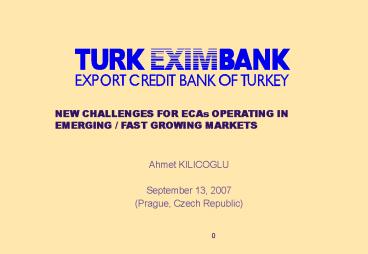Ahmet KILICOGLU - PowerPoint PPT Presentation
1 / 12
Title:
Ahmet KILICOGLU
Description:
Standard & Poor's : BB-, Stable Outlook. Moody's : Ba3, Stable Outlook ... Turk Eximbank- sole official export credit agency market leader with the lion-share ... – PowerPoint PPT presentation
Number of Views:67
Avg rating:3.0/5.0
Title: Ahmet KILICOGLU
1
NEW CHALLENGES FOR ECAs OPERATING IN EMERGING /
FAST GROWING MARKETS
- Ahmet KILICOGLU
- September 13, 2007
- (Prague, Czech Republic)
2
CHANGING ENVIRONMENT FOR ECAS - 1
- ECAs confront substantial changes in business
environment - ? Tough competition (private insurers in ST)
- ? More experience and technology brought in by
the private sector - ? Shift from standardized products basic
business model - ? Requirement for more sophisticated/tailor-made
solutions - ? Customer satisfaction concern
- ? Sharper questioning from own governments about
proper role of public sector especially after EU
Directives - ? Increasing pressure from NGOs on ECAs
Prague 2007
3
CHANGING ENVIRONMENT FOR ECAS - 2
- ? European ECAs set up subsidiary organizations
to separate their government account business
from export credit business. - ? Government-backed export business shrinks in
the total export volume in major exporting
countries. - ? WTO requirements for ECAs to break-even.
- ? Changing nature of borrowers in export
credit business from project and commercial
borrowers rather than governments. - ? Mandate of guardian authorities to support
SMEs.
Prague 2007
4
CHANGING ROLE OF ECAs
- ? Official ECAs are mostly left with
- ? longer maturities
- ? riskier countries/risks
- ? ECAs will remain critical financial
partners/financiers in taking M/L-T risks in
developing countries.
Prague 2007
5
DISTINCTION BETWEEN DEVELOPED DEVELOPING
COUNTRIES ECAs
- ? Missions are same
- ? Developed country ECAs more flexible more
financial resources, technology - ? Developing country ECAs continue traditional
role - fill in the gap of their banking sector
cover ST have to pursue the export-led growth
strategies of own gvts.
Prague 2007
6
CHALLENGES FACING THE DEVELOPING COUNTRIES ECAs
- ? Risk diversification
- ? Left with high risk long maturity
- ? Rules to be followed
- (WTO, OECD, EU Directives, Paris Club)
- ? Break-even mission by own gvts
- ? High pressure from own gvts for efficient
utilization of limited public resources - ? Less flexible to adopt to changes (products,
technology, experience) - ? Direct lending, insurance guarantee
functions together
Prague 2007
7
TURKISH CASE - TURK EXIMBANK
- ?Export-led growth strategy of all gvts
establishment of Turk Eximbank in March 1987. - ?Immature financial market indispensable in
times of crisis - Direct lending, insurance and
guarantee functions, ST being highest portion - ?Turkey WTO Member, OECD Member, EU Candidate
- ?Customs Union with EU as of Jan. 1996 issuance
of Communiqué (Export 96/12) for Officially
Supported Export Credits parallel to major
disciplines of the OECD Arrangement.
June 2006
8
GENERAL FINANCIAL OUTLOOK
- For 2006
- Total Assets 2.9 billion
- Total Loans / Total Assets 82
- Capital Base 1.63 billion
- 3.5 billion in loans and 4.3 billion
insurance cover - Total 7.8 billion support (9 of the
Turkish exports) - Rating Same as the Turkish Treasury
- Standard Poors BB-, Stable Outlook
- Moodys Ba3, Stable Outlook
Prague 2007
9
THE TURKISH EXPORT CREDIT INSURANCE MARKET
? Turk Eximbank- sole official export credit
agency market leader with the
lion-share ? 3 big players operating since
recovery from crisis provide combined cover
(export domestic credit) Result less appetite
from the market for export credit insurance
cover ? Obligation of Turk Eximbank due from EU
Directives in search of removing distortions of
competition due to state-aid ? seperate entity to
be established
Prague 2007
10
CHALLENGES FACING TURK EXIMBANK
? Plan to set up a subsidiary entity for export
credit business along with supplementary
products ? Transposition of the EU Directives
into national Law (amendment of Banks Law ) 2
Directives under External Relations Chapter ?
Rules to be followed (WTO, OECD, EU, Paris Club,
Basel II) ? Core business is mainly ST
reluctance of other financial institutions ?
Gvts export policies very high risk
countries
Prague 2007
11
CONCLUSION
- ? ECAs will always be critical financial
partners / financiers for high-risk countries/
business. - ? ECAs of developing countries are indispensable
actors for their economies.
Prague 2007
12
- THANK YOU !
June 2006































